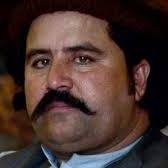Source: Front Line Defenders
About
Arif Wazir was a senior leader of the PTM, a peaceful human rights movement against extra- judicial killings, enforced disappearances, discrimination and surveillance of the Pashtun community by the Pakistani authorities.
The Pashtun people in North-West Pakistan have unwillingly been caught in the centre of regional conflicts and tensions between State security forces, the Taliban and US-Afghanistan hostilities. Their peaceful human rights work for the protection of their community and Pashtun constitutional rights has been met with hostility and often violent reprisals by the Pakistani authorities.
As a leader of PTM, Arif Wazir was a vocal critic of human rights violations by the military and has led public campaigns and peaceful protests calling for peace, accountability and redress for human rights victims, and an end to discrimination against Pashtuns.
The Killing & Investigation
On 1 May 2020, human rights defender and leader of the Pashtun Tahaffuz Movement (PTM) Arif Wazir, was shot by unidentified gunmen. The attack took place near his home in Wanna, South Waziristan in the Khyber Pakhtunkhwa Province.
The human rights defender was rushed to hospital, but succumbed to his injuries the following day on 2 May 2020. Prior to the shooting, on 17 April 2020, Arif Wazir was arrested by police in Wanna on account of a speech he made during a visit to Afghanistan, which was considered ‘anti-national’.
He spent ten days in prison, before being released on bail on 27 April. The human rights defender was shot four days later.
On 1 May 2020, Arif Wazir was shot three times by unidentified men near his home in Wanna. The human rights defender was critically injured and rushed to hospital for treatment, but succumbed to his injuries the following day on 2 May 2020. Whilst Arif Wazir was fighting for his life in hospital following the attack, a vicious social media campaign was launched on pro-government websites, vilifying him as a traitor and anti-national.
There is an emerging pattern of online vilification of and propaganda against human rights defenders after they have been the victim of an attack, which is believed to be instigated by the Pakistani authorities, particularly members of the military.
Prior to the attack, on 17 April 2020, Arif Wazir was arrested by Wanna police, and imprisoned for a speech he made during a visit to Afghanistan in March 2020, which was deemed to be anti-national. Arif Wazir was released on bail by a district court in Waziristan and returned home on 27 April. The human rights defender was shot four days and died the following day.
The attack on Arif Wazir and his arrest are direct reprisals for his peaceful human rights work for the protection and equal treatment of the Pashtun community by the Pakistani authorities. It follows a pattern of persecution against him and other human rights defenders of the PTM movement carried out by the Pakistani state, particularly members of the military.
Since April 2017, the human rights defender has spent up to 15 months in jail on false and baseless charges. He was arrested in April 2017 for leading a demonstration against the lack of internet services in Wanna.
In March 2018, he was arrested for the second time under the Frontier Crimes Regulations for organising a rally where he criticised the military’s treatment of the tribal Pashtuns on their own land.
On 3 June 2018, Arif Wazir and several other PTM members were attacked by pro-government Taliban groups, leaving Arif Wazir and many others injured. Since PTM was founded, its members have been the victims of threats, arrests and judicial harassment.
